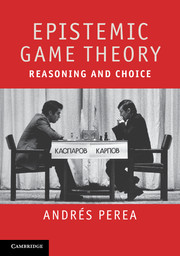Book contents
- Frontmatter
- Contents
- List of figures
- List of tables
- Acknowledgments
- 1 Introduction
- Part I Standard beliefs in static games
- Part II Lexicographic beliefs in static games
- Part III Conditional beliefs in dynamic games
- 8 Belief in the opponents' future rationality
- 9 Strong belief in the opponents' rationality
- Bibliography
- Index
9 - Strong belief in the opponents' rationality
Published online by Cambridge University Press: 05 July 2012
- Frontmatter
- Contents
- List of figures
- List of tables
- Acknowledgments
- 1 Introduction
- Part I Standard beliefs in static games
- Part II Lexicographic beliefs in static games
- Part III Conditional beliefs in dynamic games
- 8 Belief in the opponents' future rationality
- 9 Strong belief in the opponents' rationality
- Bibliography
- Index
Summary
Strong belief in the opponents' rationality
In the previous chapter we introduced the idea of common belief in future rationality for dynamic games, which means that you always believe that your opponents choose rationally now and in the future, you always believe that your opponents always believe that their opponents choose rationally now and in the future, and so on. This concept thus puts no restrictions on what you think about the opponents' choices that were made in the past – in fact you are free to conclude anything you want from what your opponents have done so far, as long as you still believe that these opponents will choose rationally now and in the future, that you still believe that these opponents also reason in this way about their opponents, and so on. So, common belief in future rationality makes a very sharp distinction between reasoning about the past and reasoning about the future: Anything goes for reasoning about the past, but very severe conditions are imposed on how you reason about the future.
In many dynamic situations, this is not the only plausible way to reason about your opponents. It often makes intuitive sense to also think critically about what your opponent has done so far, and to use his past behavior to draw conclusions about how he may act now and in the future. To illustrate this, let us go back to the example “Painting Chris' house.”
Example 9.1 Painting Chris' house
Recall the story from Example 8.1 in the previous chapter.
- Type
- Chapter
- Information
- Epistemic Game TheoryReasoning and Choice, pp. 468 - 551Publisher: Cambridge University PressPrint publication year: 2012



